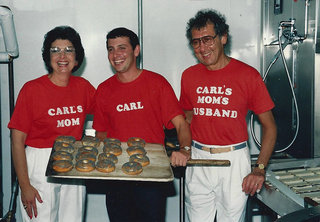To get some answers, I decided to use a more structured approach. This topic is complicated, probably highly philosophical, and I do not expect to get good answers by analysis alone. I think we need to start a dialogue with one another to discuss and define what our responsibilities might be. I created a list of questions and started asking some of my peers, i.e. developers with solid experience of working in our industry. I have collected their answers and will mark their ideas and opinions either by quoting or typing in italics to separate from my own interpretations and errors.
Introducing Sebastian
Sebastian Göttschkes was the first to accept my invitation. Sebastian is a developer living in Vienna. He is interested in programming since he was a kid and started coding when he volunteered for programming classes in school. After finishing his studies at university he has been working as professional software developer for ten years. He likes to build stuff. Read his blog or find him on Twitter to get in touch with him.
 Being Vegan
Being VeganI noticed that Sebastian was vegan and asked him about it. Some time ago he had started to eat less meat due to health problems. Being concerned about what to eat and what to avoid, he thought more about food in general which led him becoming vegan for ethical reasons. He said that being vegan is important to him because as developed being he does not want to treat other beings badly. Cruelty and killing is not necessary for his survival. It is disappointing how we, human beings treat other beings. We should be able to do better.
Other Topics of Concern
Sebastian is also very concerned how we treat one another as individuals and as society on the whole. The current refugee crisis in Europe is a perfect example. If people are starving we have to help them. We have to help first, there will be enough time for discussion later. Currently there are many discussions in the European Union regarding refugee quotas and refugees are forced to wait. Surely they need to be registered and their claims have to be verified, but that could come later. These people should not be treated like numbers on some form. Sebastian believes this to be the result of our capitalist ways. There are more and more areas where people and whole systems are reduced to numbers.
Challenges for Humanity
When I asked Sebastian about what he considered to be the biggest challenges for humanity he laughed. There are plenty. The environment is obviously very important. We need to fight climate change and forest deaths. We must not destroy our planet. Further politicians and governments need to work together smoothly to avoid wars and all the unrest caused on a global scale.
How to engage in these topics?
Sebastian likes to talk about being vegan but he makes sure not to have a reproachful attitude. People are open for the discussion when they are not attacked or forced a bad conscience. Even a single meal without meat each week makes a difference. In the current refugee crisis in Vienna he keeps donating goods and actively supports the NGOs helping refugees around Westbahnhof where he lives. He has also organised charity concerts in the past.
My first questions were just introducing Sebastian and setting the stage. The really interesting question was about the impact of our regular work. I asked him several questions regarding impact, choice of work, choice of project, customer or industry and so on.
Is it possible to have impact on your day job?
There is the social entrepreneurship movement which has similar goals. Today almost every product or service needs supporting technology so we developers have many options. As our technology is everywhere we should be able to find jobs with more impact in general. But the problem is to find suitable companies and keep the standard of living at the same time. Also it is more difficult for people with a high degree of specialisation. Sebastian looks for companies who help people in some way. Even regular companies can do that, it is not necessary to work for NGOs exclusively. But it is difficult to recognise such companies. You have to check each project you work on individually. Sometimes you cannot tell up front at all.
 Choice of Industry
Choice of IndustryWhile software development is an industry on its own, most of us work to support another industry, e.g. finance, insurance or energy, although often we do not take this choice deliberately. Sebastian does not believe that the choice of industry matters. It is more important which company you work for and even more so which project you actually work on. While the finance sector has a bad reputation, supporting micro loans to help poor people is a good thing, unless the project's goal is to rip off everybody and just make more money. In general Sebastian recommends to stay away from finance and overly capitalist industries, because of their problems discussed earlier.
Choice Based on Values
On the other hand it is not easy to find a company according to one's values. We cannot be too particular because we need the money. As we are part of the system, i.e. our society, our current way of life, our capitalist world, we have to live by its rules. All I can do is to decide according my values inside my possibilities and choose from the options I have. But the system is complex and hard to understand. There is much indirection and it keeps getting more and more indirect. For example some things we consume are not made locally. And even if we know where something was made, we do not know where its raw materials came from. It is not unusual for raw materials to travel halfway around the world. It is impossible to think about all the problems and implications so they are usually ignored.
Choice of Companies
I was not satisfied by Sebastian's answers and continued asking because I wanted to explore his values and decision process more. For example I asked him if he would work for a butcher? He denied, but he would work for a company working for a butcher. In fact he has worked on some platform of local advertisements where butchers would be able to advertise their goods as well. I kept asking and asking, but Sebastian did not have a list of undesired customers. Sebastian prefers small companies. In general small companies are less "evil" than larger ones because they have less power and cannot ignore laws. Small companies have other goals and there are still people in charge who have a conscience.
Projects are especially interesting to Sebastian when they try to change people's way of thinking without blaming. For example he mentioned TREEDAY, a gamification of checking CO2 footprints, or WienRadeltZurArbeit where you win prices by collecting miles of going to work by bike. These initiatives are great because by making people think they have more impact than by just supporting people who already care for the topic.
Conclusion
I enjoyed talking to Sebastian and it took us around 90 minutes to cover all questions. The conclusion is that there is neither black nor white. What should we do if we write software that - in the end - destroys 100, 1000 or 10000 jobs? Maybe there is no way we can do the "right" thing - either we do not know all its implications or we have no choice. But to ignore the situation is definitely wrong. We need to address the issues, preferably in a positive, improving manner.
Credits
Thank you Sebastian for sharing your values and ideas with us. I am glad you took the time and I appreciate the interesting discussions we had. Thank you very much.








No comments:
Post a Comment